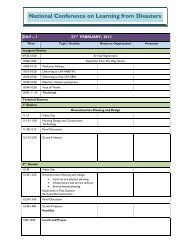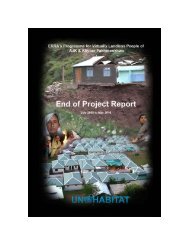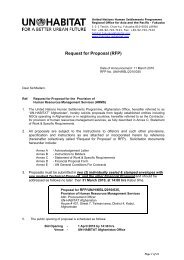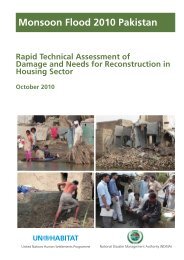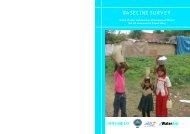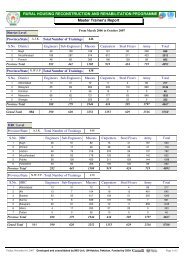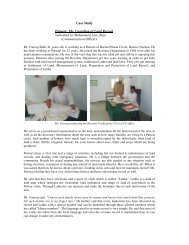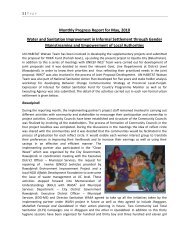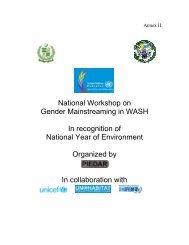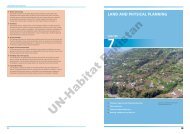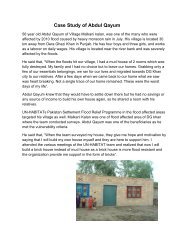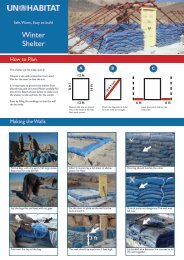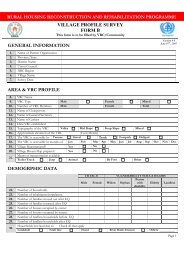Sindh-Baluchistan Regional Workshop Report - UN-HABITAT Pakistan
Sindh-Baluchistan Regional Workshop Report - UN-HABITAT Pakistan
Sindh-Baluchistan Regional Workshop Report - UN-HABITAT Pakistan
You also want an ePaper? Increase the reach of your titles
YUMPU automatically turns print PDFs into web optimized ePapers that Google loves.
<strong>UN</strong>ITED NATIONS HUMAN SETTELMENT PROGRAMMEWORKSHOP ONGENDER MAINSTREAMING IN WASHFORPROVINCIAL GOVERNMENT OFFICIALS & STAKEHOLDERS SINDH-BALOCHISTANWATSAN IMPROVEMENT IN INFORMAL SETTLEMENTS THROUGH GENDERMAINSTREAMING AND CAPACITY BUILDING OF LOCAL AUTHORITIESA Project of ONE <strong>UN</strong>, Joint Programme EnvironmentDecember 2-3, 20090 | P a g e
ACKNOWLEDGEMENTProvincial <strong>Workshop</strong> on Gender Mainstreaming in Water, Sanitation and Hygiene (WASH) is an activityof the project “Water and Sanitation Improvement in Informal Settlement through Gender Mainstreamingand Empowerment of Local Authorities”, implemented by <strong>UN</strong>-<strong>HABITAT</strong> <strong>Pakistan</strong> with Ministry ofEnvironment and <strong>UN</strong> Agencies under the umbrella of One <strong>UN</strong> Joint Programme Environment (JPC-2 1 ).This workshop was held to mark an event for celebration of the ‘National Year of Environment 2009’.The active participation of the representatives from the Provincial / Local Government, International NonGovernmental Organizations (INGOs) and Civil Society Organizations (CSOs) from the <strong>Sindh</strong> and<strong>Baluchistan</strong> provinces enabled the participants to refine their perspectives on ‘Gender Mainstreaming inWASH Programmes in an effective and efficient manner. Involvement and contributions of all theparticipants is greatly acknowledged and it is hoped that the learning from this <strong>Workshop</strong> will betranslated into Pro-Poor and Gender Responsive WASH Programmes. The workshop would also guidethe potential partners of <strong>UN</strong>-<strong>HABITAT</strong> from <strong>Sindh</strong> and <strong>Baluchistan</strong> to get guidance in understandingpractical aspect of ‘Gender mainstreaming’ and developing their skills in gender sensitive assessment ofWatSan needs in urban slums for proposal development as a Request For Proposal (RFP) has alreadybeen advertised for the said project.The active facilitation for the field visit by SRPO is highly appreciated. Contributions and assistance ofall the stakeholders who participated in this workshop and the communities who provided informationduring the field visit is highly acknowledged and it is envisaged that gender responsive programming inWASH will be carried forward to help us all.Support and guidance rendered by Mr. Siamak Moghaddam, CPM <strong>UN</strong>-<strong>HABITAT</strong>, <strong>Pakistan</strong> is highlyappreciated. Last but not least the efforts of the <strong>UN</strong>-<strong>HABITAT</strong> <strong>Pakistan</strong>’s Watsan team are recognized asprofessional and dedicated in organizing this event within short time.Kamran NaeemProject Manager11 Joint Programme Component-2 is the second strategic area focus of Joint Programme Environment which focuses on ‘Access tosafe and sustainable water and sanitation’ and contributes towards MDG 7(c)1 | P a g e
Table of Contents1. Executive Summary2. Objectives of the <strong>Workshop</strong> ……………………………………………………………………… 33. <strong>Workshop</strong> ProceedingsDay One3.1 Opening of the <strong>Workshop</strong> .…….…………………………………………………………………... 33.2 Expectations ………………………………………………………………………………………..43.3 Norms Setting …………………………………………………………………………………... 53.4 Introduction of the Water and Sanitation Improvement in Informal Settlements throughGender Mainstreaming and Empowering Local Authorities ……………………………….... 53.5 Partners projects in gender mainstreaming and WASH …...…………………………….. 63.6 Gender Mainstreaming ……………………………………………………………………….. 73.7 Gender Sensitive Participatory Assessments and Action Planning ……………………… ... 103.8 Gender Sensitive Replicable Models ....................................................................................... 103.9 Gender Mainstreaming in IEC Material development for BCC in WASH .………………… .. 124. <strong>Workshop</strong> Dinner .…………………………………………………………………………………… 145. Day Two (Field Visit)5.1 Participating Organization’s Plan of Action …………………………………………………..…. 166. Evaluation of the <strong>Workshop</strong> ………………………………………….……………………… 187. Closing ceremony ……………………………………………………………………………… 20Annexure2 | P a g e
1 Executive SummaryThis is one of the series of workshops organized by the WatSan Project of <strong>UN</strong>-<strong>HABITAT</strong> at national andprovincial levels in which government line departments, regional, national and international nongovernmental organizations and <strong>UN</strong> agencies participated. During these workshops the participants weresensitized in mainstreaming gender in water and sanitation projects and programmes particularly in the<strong>UN</strong>-<strong>HABITAT</strong> assisted water and sanitation improvement project in informal urban settlements. Inaddition the participants were briefed on the project cycle management and in conceptualizing genderrelated assessments particularly in informal urban settlements. The workshop was organized in the firstweek of November in Hyderabad which was attended by 28 senior and mid-level staff members from 18organizations and government departments from <strong>Sindh</strong> and <strong>Baluchistan</strong> Provinces. The workshopmethodology was participant centered; they were encouraged to participate in the discussions and sharetheir experiences on specific topics. Participatory techniques such as group discussion brainstorming,group work, use of pictorial slides, and visual aid were used during sessions. To maintain the continuityduring the training, review of previous day activities was conduct by the participants and further claritywas sorted out.During the workshop main topics like Introduction of the Project Water and Sanitation Improvement inInformal Settlements through Gender Mainstreaming and Empowering Government Authorities,challenges in gender mainstreaming, gender sensitive participatory approaches, replicable gendersensitive WatSan models and gender sensitive material development processes were covered through firstday sessions. The second day was allocated for the field visit, for the purpose two groups were formedkeeping in mind the aspect of gender representation. One group carried out social mapping exercise inone of the slum settlement in Pattan Colony and the other group made Daily Routine Charts for men andwomen in Hurr camp. The field data was recorded and presented to the workshop participants in theafternoon session. In the end of the workshop, participating organizations developed their action plans ofmainstreaming gender in their respective programmes followed by an evaluation of the workshop by theparticipant.2. Objectives of the workshop• Demystifying Gender Mainstreaming concepts in to simple, practical and useable illustration/successful examples for designing a WatSan project and clarifying myths around it,• Enhancing skills of participants in gender sensitive assessment of WatSan needs in urban slums.• Giving additional knowledge to the participants highlighting gender equality consideration atvarious stages of Project Cycle Management especially at Project design (ProposalDevelopment) stages.3. Proceedings of the <strong>Workshop</strong>3.1 Opening of the <strong>Workshop</strong>Mr. Kamran Naeem Project Manager, WatSan <strong>UN</strong>-<strong>HABITAT</strong> welcomed all the participants andexplained to them the purpose and objectives of two day workshop. He further informed that the presentevent is a learning exercise for all involved so the participants should have a learning attitude during theworkshop sessions and the facilitators should encourage maximum participation and sharing of3 | P a g e
participant’s knowledge. Mr. Kamran extended his thanks to the government concerned departments andthe NGOs from <strong>Sindh</strong> and <strong>Baluchistan</strong> on sending their representative to attend this workshop.Ms. Rizwana facilitated the process of introducing participants to each other’s and to the whole group.The participants were divided into two groups in accordance with their marital status. They were asked toshare their life experiences with a specific focus on gender consciousness. Then the participants weredivided into pairs according to their hobbies and gender. The members of each pair introduced the otherpartner to the whole group explaining the name, job description and the organization where he/she isworking. This activity continued till the last pair was introduced to the group.3.2 ExpectationsThe participants were provided with flash cards by the resource person and they were asked to put downtheir expectations related to the workshop. The objective of this session was to know the level ofunderstanding of the participants on the subject and agree with them on the common objectives andsessions of the two day workshop. The following expectations shared by the participants which weresummarized:• Learn more on gender mainstreaming in (WASH because it is a new concept in urban context• What <strong>UN</strong>-<strong>HABITAT</strong> is and what are the objectives of the organization• Improve water action plans for safe drinking water in urban as well as in rural areas• Learn designing and implementing approach of WASH including gender mainstreaming• Understand the concept of mainstreaming gender in overall project activities (PCM)• Understand the concept of gender equality• Learn more of gender concepts in general• Understand mainstreaming gender in Water and Environmental Sanitation (WES) projects• Recognize gender roles and responsibilities in water and sanitation improvement projects• Knowledge sharing process and a productive outcomes in the end of the workshop• The workshop will help develop a strategy linking health and hygiene with water and sanitationfacilities at grass root level.4 | P a g e
3.3 Norms SettingTo create a learning environment and maintaining focus on the topic, ground rules were developed for thetwo day workshop/sessions together with the workshop participants. Then a committee was formed tomonitor the implementation of ground rules emphasizing on managing time and maintaining disciplineduring the sessions.Ground rules agreed• All the participants should keep their cell phones powered off or put on silent mode• Discipline should be maintained• Any participants found guilty of violating the rules should be fined/punished3.4 Introduction of the Project Water and Sanitation Improvement in Informal Settlementsthrough Gender Mainstreaming and Empowerment of Local AuthoritiesMr. Kamran Naeem delivered a power point presentation in which he briefed the participants on One <strong>UN</strong>Reform Programme, <strong>UN</strong> Joint Programme development process and <strong>HABITAT</strong>’s presence in SouthAsian Cities. He further explained the goal, objectives and implementation plan of the project “Water andSanitation Improvement in Informal Settlements through Gender Mainstreaming and Empowerment ofLocal Authorities”.Mr. Kamran Naeem elaborated that the Joint Program Component-2 is the second strategic area focus of<strong>UN</strong> Joint Program Environment which includes safe and sustainable water and sanitation facilitiescontributing towards MDG 7(c) and collaborative working relations between <strong>UN</strong> Agencies and concernedgovernment Ministries at Federal and Provincial levels. He informed that <strong>UN</strong>-<strong>HABITAT</strong> <strong>Pakistan</strong> wouldwork with local organizations having Memorandum of Understanding (MoU) with Governmentwater/sanitation service providing agencies at local level. In selecting future partners the <strong>UN</strong>-<strong>HABITAT</strong>would appreciate those organizations who have good record of collaboration with governmentdepartments including Tehsils Municipal Administration. He advocated participants to highlight genderneeds by including specific messages on gender issues, practical and innovative ideas while developingproject proposal for <strong>UN</strong>-<strong>HABITAT</strong>’s assistance. He added that the present project should have a broaderaim to improve health and sanitation within the informal settlements and empower women within thedecision making mechanisms at community level. He shared the following facts which are providingbases for the Joint <strong>UN</strong> Programme Component 2 (JPC-2);• In <strong>Pakistan</strong>’s poorest provinces: less than 50% and 60% of rural and urban populations haveaccess to improved water and sanitation respectively• 50 million people rely on open defecation• In urban slums, water and sanitation services are haphazard and unreliable• Ensuring environmental sustainability, in particular Millennium Development Goal (MDG)Target 7c on access to safe water and improved sanitation, ‘to have by 2015 the proportion ofpeople without access to safe water and basic sanitation’ and Millennium Development Goal 7,target 11, ‘to achieve significant improvement in the lives of at least 100 million slum dwellers by2020’.5 | P a g e
• The JPC-2 also uniquely contributes to all other MDGs; Aligned with Government policies,Poverty Reduction Strategy Plan-I & II, Mid Term Development Framework 2005-2010.Mr. Kamran Naeem presented silent features of the project 2 ’s implementation strategy as;• Focus on informal settlements with special emphasis on women and children• Bottom-up/upward approach by maximum participation of the community• Awareness and capacity building at all levels• Partnership and networking with stakeholders• Advocacy and mass communication for behavior change• South to South partnership and collaborationWhile updating on project progress and arrangements he informed that the project is kicked off with aprofessional team on board and is being implemented according to an agreed action plan developed inclose coordination with Ministry of Environment, <strong>UN</strong>ICEF and <strong>UN</strong>IFEM. A comprehensive situationalanalysis process has been initiated for identifying and mapping informal settlements in the country incollaboration with stake holders of JPC2 and Provincial Government counterparts. Working relations forcollaboration with concerned Ministries at Federal and Provincial level have been established. TheRequest For Proposals (RFPs) for Islamabad, Rawalpindi, Hyderabad and Muzaffarabad has beenlaunched and complimentary projects are in the process of development to provide maximum support tothe project.In the end of the presentation participants inquired about JPC2, <strong>UN</strong>-<strong>HABITAT</strong> master plan withgovernment and the focus of the project?Mr. Kamran Naeem responded that the Joint Program Component-2 is the second strategic area focus ofJoint Program Environment which includes safe and sustainable water and sanitation contributing towardsMDG 7(c) and the working relations for collaboration with concerned Ministries at Federal and Provinciallevel; and <strong>UN</strong> agencies. He further explained that <strong>UN</strong>-<strong>HABITAT</strong> <strong>Pakistan</strong> would work with localorganizations that would bring MoU with Government water/sanitation service providing agencies. Hefurther added that those stakeholders would be appreciated who had previous records of involving TehsilsMunicipal Administration in action planning. He told the participants that the message for addressinggender needs would be highlighted and looked ahead for innovative ideas in this regard.3.5 Partner’s Projects in Gender Mainstreaming and WASH<strong>UN</strong>ICEF Gender and WASH ApproachMr. Krishen Chand from SAFWCO (partner organization of <strong>UN</strong>ICEF) briefed the participants in hispresentation on <strong>UN</strong>ICEF activities related to gender mainstreaming and WASH approach. He informedthat the <strong>UN</strong>ICEF is assisting projects on school water, environment and sanitation, community water,2 Water and Sanitation Improvement in Informal Settlements through Gender Mainstreaming and Empowerment ofthe Local Authorities.6 | P a g e
Community Led Total Sanitation, drinking water monitoring and mitigation, arsenic treatment andprevention, hygiene promotion and humanitarian WASH.He further described that <strong>UN</strong>ICEF’s main focus is on girls between ages 5-9, mothers, water hardcommunities, disaster prone communities, elderly and disabled people, rural women and men. The<strong>UN</strong>ICEF recognizes equality and equity while working with the communities and acknowledgesinvolvement of vulnerable groups at all stages of project cycle management.He presented examples of women led activities, the arsenic mitigation model operated by women indistrict Khairpur and Mirpur Khas and water sources operated and maintained by women.3.6 Gender MainstreamingMr. Kamran Naeem facilitated the session. He introduced objectives of the session and explained that thesession has its two parts.Part one: Participants PerceptionsParticipants were asked about their perception of term ‘Gender Mainstreaming. In a brainstorming sessionthe perceptions of the participants were collected using colored flash cards, which were clustered andsummarized as:• Dignity and rights of women should be treated as priority• Violence against women should not be continued• Men and women should be equally partners of every development work• Sharing experience, ideas and work initially to get benefits for development• Participation of women in social and economic development• To end social taboos in respect of gender biased attitude and discriminationCommenting on the outcomes of the brainstorming session Mr. Kamran Naeem further elaborated theconcept of gender mainstreaming. He informed that in most of the cases it has been noticed that womenhad been completely neglected in development planning as participants and actors of change. They wereperceived only as passive recipients of some welfare services. This led scholars, academician and womenmovement referring to the “Integration of Women in Development” through Women in Development(WID) Projects, however, these projects remained small isolated initiatives of income generation. Thiswelfare oriented approach came under swear criticism as it has little potential to bring out a substantialchange in women’s situation or in gender power relation. These then led to the concept and strategies ofWomen and Development (WAD) and Gender and Development (GAD) focusing on various aspects ofequality and participation. This shift was more inclusive in approach and understanding the nature ofwomen subordination in the context of gender relationHe further explained that the strategy of gender mainstreaming is basically the recognition of need to lookat the concerns and perspectives of women and men and the gender relations, roles and responsibilities7 | P a g e
impacting women participation in development program and projects. While explaining the equality hemade clear that the rights, responsibilities and opportunities will not depend on whether they are bornman and woman. Gender equity on the other hand means fairness in the treatment of women and men. Hefurther said that we need to wear the glasses of gender and keep in mind the need of women in focusspecifically.Part two: Challenges and StrategiesParticipants were asked to identify the practical challenges faced by them in Gender Mainstreaming intheir projects. Through a brainstorming session a list of challenges faced were written on the flip chart.The participants were then divided into three groups, each group was given a set of challenges identifiedin the first exercise related to gender mainstreaming, and they were asked to suggest possible solutions forthe identified challenges. For further guidance each group was provided with a gender checklist askingthem to use their own experiences while suggesting solutions. The groups developed their presentationsusing their practical experiences and taking guidance from the gender checklist and finally presented thefindings to the whole group.Groups One:Challenges and StrategiesSr # Challenges Strategy1 Lack of basic rights (Reproductive,Sexual and Health)Awareness and Social Mobilization (sensitizationmeeting with community and line departments)2 Socio-Cultural Barriers Community mobilization at grass root level (developIEC material in local language, and theater)3 Religious, political and feudal problems Meeting with the gate keepers (feudal). (developing8 | P a g e
and implementing BCC Strategy)4 Unavailability of services for women Construction of latrine under the approach ofcommunity participation and providing educationservices/facilities5 Empowering other gender groupsexcept womenMale dominant society (Creating awareness in eachdevelopment sector of the stat for the empowerment ofwomen).Group Two:Challenges and StrategiesSr # Challenges Strategy1 Privacy for effective utilization oflatrine and timing2 Women voices entrance and acceptanceof the communityDetail assessment and baseline (gender rapidassessment)Deep intervention for trust building3 Interaction and access To small group / core group / focus group4 Behavior change Behavior change through gender sensitive intervention5 Lack of institutions Creating awareness through documentary and IECmaterial6 No reproductive health acceptance Coordination with line department cooperation7 Social Taboos and poverty Linkages with different agenciesDuring the feedback session participants commented that if women are economically empowered thenthey can take decision on type of latrine they want and health and hygiene facilities they needed.Group ThreeChallenges and StrategiesSr # Challenges Strategy1 Social norms (against womenempowerment)2 Lack of access to resources (health,education, water and hygiene)3 Access to economic resources andearning sources4 Lack of access to means ofcommunicationAwareness through education, seminars, training andworkshop.Create awareness and build capacities to get access tothe resourcesCreate awareness and capacities to access to resourcesNetworking of NGOs, government, CBOs, CSO, andcommunity9 | P a g e
3.7 Gender Sensitive Participatory Assessments and Action PlanningMr. Kamran Naeem facilitated the session. He introduced the objectives of the session which was tocustomize Participatory Reflection and Action (PRA) tool for WASH programs. A detailed discussionwas generated among the participants on Participatory Assessments and Action Planning and readingmaterial on the subject was distributed among the participants. During the session various questions andqueries were raised and discussed like; women role in decision making process at executive level,presence of women in institutions at regional, national, provincial and local levels and involvement ofwomen in policy related issues. A general realization was created among the participants in order toconclude that women presence is low in the planning process water and sanitation strategies and in policyformation. The facilitator explained learning process using a proverb as; People learn 20% of what theyhear, 40% of what they hear and see, 80% of what they hear see and do and 100% of what they discoverby themselves.Mr. Kamran Naeem delivered a detailed presentation on history of PRA and its developmental processes.During his presentation he reminded the need for integration in organizational management, in policyformation and program planning including gender audit in the process of monitoring and evaluation. Heidentified some of the PRA tools commonly being used for the assessment, planning and evaluations ofprojects and programmes e.i. Semi Structured Interviews (SSIs), In-depth Interviews (IDIs), TransectWalk, Mapping, Ranking, Daily Routine Chart, Seasonal Calendar, Historical Profile, Flow-diagram,System Diagram and Pie Chart. He further emphasized on using separate PRA tools for women and men,girls and boys in order to have the practical solutions thus developing sense of empowerment in the localcommunities.3.8 Gender Sensitive Replicable ModelsMr. Kamran Naeem explained the objectives of the session as to analyze three different WASH programmodels with gender prospective. Three working groups were formed and each group was provided with acase study. The groups were asked to analyze the case study critically and develop a presentationincorporating the following questions:How will your organization ensure gender mainstreaming in the following stages of project cycle? Assessment and Analysis Project Design Implementation Monitoring EvaluationsCase study 1 (Humanitarian Response to IDPs)In July 2005, flood affected the district of Liayyah in Punjab. Thousands of villagers took refuge in asafer Thesil of the district, most of them stayed in government schools for more than two months. One ofthe main problems faced by the IDPs was non availability of latrines, and the sanitation facilities availablein the schools were not sufficient which were choked-up very soon. Your organization is to respond tothis situation through a project of 2-3 months duration. The major activities of the project is suggested10 | P a g e
uilding new latrines, ensuring proper functioning of existing latrines, and designing a campaign for handwashing to reduce incidences of diarrhea among the IDPs.Case Study 2 (Provision of water bore hand pumps)Thirty villages are situated in dry desert in the rural area where the only source of water is under ground.The population is pre dominantly conservative Muslims. In the recent past there had been war in thecountry that created gender imbalance, left with 60% women and 40% men population. Your organizationis to provide water bores with hand pumps for the above villages. In order to make the project sustainablecommunity members are to be provided skills in repair and maintenance of the hand pumps.Case Study 3 (Low Cost Sanitation on Self Help Basis)In the city of Rawalpindi district of Punjab, open drains in the streets are causing diseases such asdiarrhea, hepatitis and malaria. Water channels are under ground and often would leak water and theleaking water mixes with drinking water source. In addition, this is esthetically disturbing as it producesbad smell and ugly look/sight. Your organization is to mobilize, organize people and provide technicalsupport to lay underground sewerage pipes on self help basis.Group one: Presentation Humanitarian Response to IDPsAssessment and analysis Implementation Monitoring and Evaluation- Multi disciplinary team composition- Situational analysis by men andwomen- Gender disaggregated data collectionand analysis for identification ofwomen needs-Involvement of all stakeholder- Designing according to budgetand equal access to genderMonitoring and evaluation ofall gender group because theproject is on emergencyresponseGroup Two Presentation on Provision of water bore Hand PumpsAssessment and Analysis Design and Implementation Monitoring and Evaluation- Team should will be genderbalanced for assessment and analysis- Collection of gender disaggregatedprimary and secondary data- Identification of available resourcesfor all gender groups- Problem/issues and need assessment- Analysis of data regarding gendermainstreaming- Setting of objectives inaccordance with gendermainstreaming- Intervention should be relatedto gender mainstreaming-Developing linkages betweenorganization and linedepartment- Formation of PMC includingcommunity representatives(M/F), project manager,organizations and relatedstakeholder- Human resource especially- Quarterly bi annual andannual monitoring- Impact of the project- Benefits to various segmentof the society11 | P a g e
females- Special attention should begiven to “Gender” whilebuilding capacityGroup Three Presentation on Low Cost Sanitation on Self Help BasisAssessment and Analysis Design and Implementation Monitoring and Evaluation- Team will be develop comprising 5males and five females led byexperienced females- Data collection by the women fromthe women in the time periods of 15days (300 households).- Low cost sanitation and wateron self help basis- Social mobilization for the toavoid diseases- Capacity building/technicaltraining to improve sanitationand drainage system- Water and sanitation softwareand hardware implementationusing participatory approach- Community meetings- Cooperation and coordinationwith line departments.3.9 Gender Mainstreaming in IEC Material development for BCC in WASH- Follow- up Sessions andcoping with the problem- Probing hurdles andcontrolling- Sensitization to continue theprogram on regular basis andkeep in mind the MINI-MAXThe objective of the session was enabling participants to understand need for Gender Mainstreaming inIEC Material development under BCC-WASH Program. The resource person from Tahleeq foundationshowed a picture with multiple possible interpretations, he collected views of participants and theirinterpretations were varying from each others. He explained that if the people in this room have differentperceptions on a single picture then you have to think to collect the representative/collective perceptionsof the people for developing the BCC strategy.12 | P a g e
He further explained that BCC strategy should be community centered and should be based on learningand action along with political support with following characteristics.• BCC Messages shall not reinforce inequitable gender roles or stereotype• BCC Messages and materials should include positive or optimistic role models• BCC Messages; materials, and activities needed to address the appropriate needs andcircumstances of women and men; boys and girls. In particular, differences carrying workload,access to information and services and mobility.• Simple BCC messages so that these were easily understandable to women• BCC Messages must state explicitly the actions that audiences are able to take forward• Visual aids to be incorporated in the BCC messagesA case study of IDRAK (NGO) was shared with the workshop participants regarding related todevelopment of IEC material and delivery of messages: Two messages were delivered by the IDRAK tocommunities:Message 1: Hepatitis can be transmitted from effected mother to childMessage 2: Possibility of transmitting HIV through sex (remain to your life partner)The feedback received from the community on the first message was that the infected mother could infectthe breast feeding child so they should immediately stop feeding their babies and that the pregnant womenshould not go for delivery or they should think of treatment first.The feedback received from the community on the second message was• There were few cases where husband of infected wives ended up with gender based violence likebeating and humiliating• On the reason of Islamic belief/culture not permitting a wife to leave her husband, many carriersof virus (husbands) infected their wives forcefullyBased on the community feedback the IDRAK adopted the following methodology for developing IECmaterial and delivery of messages;• Review of material for in cooperating gender perspective based upon research findings andsharing it with subject specialist for further perusal and improvement.• Web results were downloaded and findings regarding these two massages utilized based uponmedical research done by international agencies• Material was transformed into easily understandable Urdu language in order to overcome themyths exist in the communityIn the end the BCC Specialist WatSan Project, <strong>UN</strong>-<strong>HABITAT</strong> Ms. Rizwana showed an animatedBCC material to the participants and asked them to share their observations focusing on genderperspectives. Participants were of the view that women were shown fetching water and theirproductive activities were not highlighted in the movie which strengthens their reproductive stereotype role. Participants after some discussion also realized that all the responsibility of people gettingsick in a family due to unhygienic environment was portrayed to be of women in the animated BCCmaterial.13 | P a g e
4. <strong>Workshop</strong> DinnerA special interactive dinner was arranged for the representatives of Local Government, ProvincialGovernment and Civil Society Organizations. The Managing Director WASA Hyderabad was specialguest for the dinner. He appreciated on taking initiative for WASH program in informal settlements andensured his cooperation for <strong>UN</strong>-<strong>HABITAT</strong> work. Kamran Naeem from <strong>UN</strong>-<strong>HABITAT</strong> thanked theparticipants for attending this special occasion.5. Field VisitOn second day a briefing session was organized for the application of gender sensitive participatoryassessment and analysis tools in the field, and then the participants were taken to two informal settlementsin Hyderabad. In the afternoon, both working groups participated in the de-briefing sessions. The fieldvisit was facilitated by a local organization SRPO and workshop participants visited the Kumar /PattanColony and Hurr camp, the slums of Hyderabad.The participants practiced social mapping and transect walk in the community. Mapping exercise wasdone separately with men and women.Outcome of the Social Mapping and Transect Walk:• Women are making domestic pottery (utensil etc), working as home servants, and do small jobsas daily wage labor.• One school is present in the whole colony and enrollment rate of girls is very less as compare tothe boys because men are not encouraging female education.• All street gutters were open and in many households latrine facility is not available. Men and14 | P a g e
women go to the open fields for defecation. The face a number of problems during rainy sessionand during the day time. Some time women wait for two days to avail the defecation facility sodue to the pressure for defecation become sick.• We are contributing in our economy of households but are being ignored always said the womenin the colony. This is the first time in our life time that we are sharing our problems in thismeeting added by another woman. Our males are hypocrite they send us for work to the homes ofpeople’s but not allowing us to sit in the meeting for sharing our problems one womancomplained.• After the hectic day women wake up at 3:00 am in the morning and fetch drinking water fordomestic use. If they do not fetch water men beat them.• All sewerage lines are damaged and mix with drinking water pipe line through which children aresuffering but males only allow treatment of male child and girls are treated with traditionalmethods.• Women mostly remain overburden due to fetching water with all activities.• The work place of pottery making was smelly because all type of waste was disposed there.• We remain busy in household labor work during the day so we fetch water at night. Fetchingdomestic water is the responsibility of women.Outcomes of Routine ChartField visit of Hur CampFemale Routine Charts- Wake up early around 3 am- Animal rearing and fetching water- Go for defecation in the open area- Offering prayer- Preparing breakfast and dress up children for schools andhusbands on job- Cleaning home and washing utensils- Folding beds- Stitching clothes and Rali (Traditional carpet) and charge100-150 per suit- Prepare lunch- Making and serving of evening tea- Cleaning the house in evening again- Again washing pots boiling milk- If get time watching TV but most of the time watch TVwhile working- Prepare dinner and washing pots- Setting bed for the whole family- Put children for sleep and feed animalsMales Routine Charts- Wake up around 5 am and offerprayer- After doing breakfast went for jobs(labors, shop keepers, barbers etc)- Around 5 pm reach back home andtake evening tea.- Take rest for some time- Watching TV or chat with friends- Drinking wine or tea with friends- Addict males beat their wives whenthey do not gave them money- Males recreation hours are 17 hoursincluding sleep, while womenrecreation is only sleep that is 5 to 6hours15 | P a g e
In debriefing session Mr. Kamran Naeem raised questions on gender based violence and genderdiscrimination issues for discussions? The team explained that women said if food is bit spicy, clothes arenot pressed, shoes are not polished then women are beaten by their husbands. Women spent their moneyto fulfill children’s needs or making household assets. No recreational hour for women is available,outing is an occasional practice. In some cases men even do not allow females to watch TV.5.1 Plan of ActionMr. Kamran Naeem encouraged the representatives of participating organizations to develop their actionplans for gender mainstreaming. The fallowing action plans were developed and shared in the plenarysession.S.N Organizations Activities for Action01 <strong>Sindh</strong> Development Society • Identification of slum area in urban localities• Conducting PRA demonstration for rapid assessment in theseslum areas• Consultation meeting in order to improve the WASHprogram• Development and submission of project proposal• Sensitize TMA’s representatives in various workshops andseminars• Advocacy campaign will be launched to mobilize theinhabitants of slums and development of BCC material forthem.02 <strong>Sindh</strong> CommunityFoundation03 Shahbaz DevelopmentFoundation04 Indus Developmentorganization• Capacity building of males and female staff on sanitation• Formation of male, females and youth CBOs and creatingawareness through mobilization for education. It’s already inprocess but Now SCF will do gender mainstreaming incurrent projects.• Conducting orientation session of staff of SDF on How toMainstreaming Gender• Mobilization of the community for participation in decisionmaking on self help basis.• Sending proposal of gender mainstreaming to national andinternational organization• Assessment through trained participatory tools• Development of proposal• Sending proposal to <strong>UN</strong>-<strong>HABITAT</strong>• Capacity building will be processed through workshop andadvocacy• Infrastructure will be developed and monitoring processwould be conducted if received funding05 The Blessing Foundation • Capacity building of staff on gender mainstreaming• Team constituted (Gender Balance)• Need assessment of the target areas by using PRAassessments tools16 | P a g e
• Analysis of PRA data• Debriefing with target communities• Planning and implementation of BCC strategy, advocacy,awareness program06 SAFWCO • Use of trained PRA tools for assessments and proposaldevelopment07 Sukkur Blood & DrugDonation Society• Orientation training of staff on gender mainstreaming• Formulation of gender balanced team in organization• Launching social mobilization and awareness on gendermainstreaming• Development of BCC material08 SHEDS • MOU singing with TMA & WASA• Rapid assessment by learned PRA tools.• Meeting with district government and community• Training of stakeholder on the gender mainstreaming for thecapacity building• Social mobilization for water treatment• Exposure visits of the model areas regarding water andsanitation• Gender Mainstreaming in WASH keeping focus on crosscutting issues, power sharing of females, for advocacy andprivacy for female during using toilet.• Supervision, monitoring and evaluation09 <strong>Sindh</strong> Rural Partnerorganization• Identification of potential area• Data collection through PRA• Discussion and consultation meeting with stakeholders• Making women groups and monogram for WASH andlaunching advocacy campaign.• Preparation for BCC in WASH10 Takhleeq foundation • Sharing of workshop material and contact with colleagues• Hold PRA training with the organization• Development of code for gender mainstreaming as crosscutting themes in the ongoing projects• Incorporate this learning for the submission of RFP anddevelopment of BCC strategy11 Mehran Welfare Trust • Training of the staff on gender mainstreaming• Use of PRA tools for assessment• Social mobilization for awareness on gender mainstreaming12 National Trade UnionFederation• Awareness raising program through study clients and trainingwith community• Mainstream the gender mainstreaming strategy inorganization• Women participation in improvement of13 Gender and reproductive • Sharing of workshop material and contact with colleagues17 | P a g e
Health Organization • Hold PRA training with the organization• Development of code for gender mainstreaming as crosscutting themes in the ongoing projects• Incorporate this learning for the submission of RFP anddevelopment of BCC strategy6. Evaluation of the <strong>Workshop</strong>Evaluation forms were distributed among the participants for workshop evaluation. The details of theevaluation are presented in tables as:Understanding of <strong>UN</strong>-<strong>HABITAT</strong> project of water and SanitationCategories No of Participants %Excellent 12 43Good 12 43Fair 04 14Total 28 100%43 % participants got excellent understanding on WATSAN project and same percentage got goodunderstanding of the project.Gender mainstreaming in <strong>UN</strong>ICEF WASH project?Categories No of Participants %Excellent 11 40Good 11 40Fair 06 20Total 28 100%40% participants understood the <strong>UN</strong>ICEF WASH program presentation up to excellent and same 40 %got good understanding about Gender Mainstreaming in <strong>UN</strong>ICEF projects and only 20 % of participantswere at satisfactory level.Understanding on Gender Mainstreaming in WASHCategories No of Participants %Excellent 15 54Good 08 29Fair 05 17Total 28 100%54% got excellent understanding on gender mainstreaming in WASH, 29 % got good understanding and17% need more clarification on the subject.18 | P a g e
Introduction to Gender Sensitive Participatory AssessmentCategories No of Participants %Excellent 15 54Good 08 29Fair 05 17Total 28 100%A high number of participants got excellent understanding of how gender sensitive participatoryassessment is conducted for development of projects, 29 % obtained good understanding and 17%required more knowledge.Gender Mainstreaming in BCC for WASHCategories No of Participants %Excellent 14 50Good 09 32Fair 05 18Total 28 100%50% of the participants take hold of excellent knowledge on gender mainstreaming for BCC materialdevelopment in WASH, 32 % have good knowledge AND Only 18% got some knowledge on the topic.Gender Sensitive Replicable Model for implementation of WASH program?Categories No of Participants %Excellent 13 47Good 11 40Fair 04 13Total 28 100%47 % participants got excellent understanding on gender sensitive WASH replicable models , 40 % gotgood understanding and only 13 % hold satisfactory knowledge.The facilitator’s delivery style and commend over session?Categories No of Participants %Excellent 15 54Good 11 39Fair 02 07Total 28 100%54% commented excellent on facilitator’s delivery style, 39% ranked good and only 7% placed as fair.19 | P a g e
Logistic arrangementsCategories No of Participants %Excellent 13 47Good 10 36Fair 05 17Total 28 10047% participants evaluated logistic arrangement (accommodation, venue, food, tea and vehicle) asexcellent, 36 % ranked good and 17% evaluated as fair.General Recommendation by Participants:• The training duration should be long for the understanding of such broader concept like gendermainstreaming.• All selected PRA tools should be practiced in field as part of training.• Good to have field based trainings and exercises.• There should be more teams for field exercises.• Reading material should be provided two days before the training course.• This is good that before launching the call for proposal training is being conducted• Training should be for the project targeted areas and involving more government officials wouldbe more beneficial to achieve the project goals.• Women participants are very less in the training need to increase number in gendermainstreaming trainings.• The Urdu language should be at preference in the training.• The workshop should be more participatory.• There should be also community representation in such trainings7. Closing CeremonyAt the end of the workshop Mr. KamranNaeem distributed certificates among theparticipants on their participation in theworkshop. He paid special thank to DistrictGovernment, Local Government, WASA,TMA, <strong>UN</strong>ICEF, and SRPO for assisting andparticipating in the workshop.20 | P a g e
ANNEXUREProvincial Orientation <strong>Workshop</strong> on Gender Mainstreaming in WASH for PG, LG Officials and Stakeholders<strong>Workshop</strong> Agenda and Schedule (2 nd -3 rd , December, 2009)<strong>Workshop</strong> Objectives:• Demystifying ‘Gender mainstreaming’ concept in to simple, practical and useable illustrations/ successful examples for designing aWatsan project and clarifying myths around it.• Enhancing their skills in gender sensitive assessment of Watsan needs in urban slums• Highlighting Gender Equality considerations at various stages of Project Cycle Management, especially at Project Design (ProposalDevelopment) stage.Day 1Time Session Contents and expected outcomes MethodologyResourcePerson/Facilitation08:30 – 09:00 Registration of theparticipants Participants will fill out the registration forms andwill return filled forms to the reception deskRegistration FormsRizwana KousarBCC Specialist Watsan<strong>UN</strong><strong>HABITAT</strong>-<strong>Pakistan</strong>09:00 – 09:05 Recitation from the HolyQuran.09:05 – 9:20 Welcome Note./Ice breakingand Introduction ofParticipants09:20 – 09:40 Introduction of Water andSanitation Improvement inInformal Settlement GenderMainstreaming andEmpowerment of LocalAuthorityOne of the Participants will recite versus from theHoly QuranRecitation Name, work experience & perception of Gender Participants’introduction in pairsObjective of this session is to bringing workshopparticipants; project staff and training team inparticular, at the same level of understanding ofthe project in terms of the project goal,objectives, activities and interventions and issuesand expectations from the workshopPP PresentationParticipants LedRizwana KousarKamran Naeem ProjectManager Watsan<strong>UN</strong>-<strong>HABITAT</strong>0 | P a g e
09:40 – 10:00 Gender Mainstreaming inUnicef’s project10:00 –10:20 Matching expectations withworkshop objectives.Formation of groups forGroup Work. TrainingNorms Setting,10:20-11:00 Participants’ perceptions ongender mainstreaming andchallenges they face inpractical workParticipants will get familiar with Gender sensitiveneeds being addressed through Unicef Project.Participants will establish a commonunderstanding of the purpose and objectives ofthe workshop and methodologies adopted intraining sessions.Placed in different groups, participants will learnthe terms of references (ToRs) about group workexercises and Field Visits throughout theworkshop course.Trainees will identify their present perceptions,practices and & problems regarding GenderMainstreaming and Challenges faced in practicalwork and implementation of WASH Programme.Interactive SessionPP PresentationInteractive session,Colored Cards etc(Participants Led)Group Work/GroupPresentation,Interactive Session,Colored Cards,Krishen chandKamran Naeem/Rizwana KousarKamran Naeem/Rizwana Kousar11:00 – 12:00 Suggestions on how tohandle the above identifiedchallenges12:00 –12:30Participants will be divided into three groups andeach group will chalk down the possible solutionsto address the challenges identified in the abovesession.Tea Break & Group Photo.Plenary, Participantsreflect their ideasabout Gender usingcolor cards.Categorization ofideas.PP Presentation anddiscussions in thelight of ideas, earlierexpressed byparticipants.Hand outs.Kamran Naeem/Rizwana Kousar12:30-13:30 Introduction to GenderSensitive ParticipatoryAssessments and ActionPlanning• Participants will understand the ways ofcustomizing Gender Sensitive ParticipatoryAssessment/Analysis tools for WASHProgramme.Interactive Sessions,PP PresentationsKamran Naeem/Rizwana kousar1 | P a g e
13:30 – 14:30Lunch Break and Prayerbreak14:30-15:30 Gender sensitive replicablemodels for implementingWASH ProgramParticipants will study and analyze three differentWASH Programme models with GenderMainstreaming and will suggest improvements.Group WorkInteractivediscussion.PP PresentationRizwana kousar/Kamran Naeem15:30 – 16:00 Tea Break16:00 – 16: 15Gender Mainstreaming inIEC Material developmentfor BCC in WASHParticipants will enable themselves to understandneed for Gender Mainstreaming in IEC Materialdevelopment for BCC in WASH Programmethrough a case study.Presentation,Brainstorming anddiscussion.M.Yaqoob CEOTahleeq FoundationIEC MaterialDevelopmentSpecialist/ Rizwana16:00 – 17:00 Team building for next daysfield work and facilitationplanParticipants will volunteer to become part of fieldteams and assume different roles andresponsibilities for practicing the identifiedParticipatory tools1700 – 1900 Rest Participants will refresh themselves to join theworkshop dinner1900 - 2100 <strong>Workshop</strong> Dinner Participants will Socialize and Interact with peersworking in WASH sectorTeam distribution,Voluntaryassumption of rolesand responsibilities,logistics planning.IndividualpreferencesBuffet DinnerKamran Naeem/Rizwana KousarParticipants ledHotel ManagementDay 2Time Session Contents and expected outcomes Methodology Resource Person08:30 – 13:30 Field Exercise for practicingGender sensitiveparticipatory assessmentand analysis toolsThe participants will be divided into threegroups and each group will carry out gendertool assigned to it in the field.Field visit, documentation,case studies (if any)Facilitation by <strong>UN</strong><strong>HABITAT</strong> WatsanTeam and Sind RuralPartners Organization13:30 – 14:30 Lunch <strong>UN</strong>-<strong>HABITAT</strong> Teamwith Hotel2 | P a g e
14:30 – 15:30 Group Debriefing Three Groups Participants will getopportunity to reflect on learning from theworkshop and fieldwork and expresschallenges facedPlenary in three groupsmanagementKamran Naeem/Rizwana KousarZahida DethoCEO(SRPO)15:30 – 15:45 Action Planning Participants will note and share specificactions to be undertaken by theirorganizations or at individual level based onthe workshop learning15:45 - 1600 <strong>Workshop</strong> Evaluation Participants will fill out the evaluation formsprovided to them and will return them backto the facilitatorsColored CardsFlip ChartsEvaluation FormsKamran NaeemRizwana KousarZahida DethoKamran NaeemRizwanaZahida Detho3 | P a g e
List of the Participants4 | P a g eS# Name of Participants Organization Designation1 Daleep Singh Safwco Social Organizer2 Imtaiz gul SCF Program Coordinator3 Khair Muhammad ChanaShabaz developmentOrganizationChairman4 Zehra Khan HBWWA &LEF Coordinator5 Abdul Hameed Bullo SRSO<strong>Regional</strong>Manager6 Nasir Mansoor HBWWA &LEF Board Member7 Atta ullah Khan Kakar GRHO Director8 Zubair Ahmad Qazi TBF Program officerGeneralContact Numbers/EmailsSodho_daleep@yahoo.comjavedsozhalai@yahoo.comsdfsindh@hotmail.comzareenakhan@yahoo.comBullo_equip@yahoo.comntufpak@gmail.comGender_qta@yahoo.comCallmeqazi@gmail.com9 Zahidha Detho SRPO Executive director dethoz@yahoo.com10 Samina SRPO Program Officer 0332281668211 Abdull Qayum XEN WASA HDA 0300-937376512 Krishen chand Engineer Safcow 0300330077013 Dr Zahid SHED Program coordinator14 Punjal KhanMehranorganizationwelfareCEO15 Javed Iqbal M.T CIDAShed.org@gmail.com0300-3430741jiyzai@hotmail.com
16 Naseeb Ullah Khan D/ Engineer Govt 0300938148117 Naseer Ahmad Supervisor WASA 0300938118818 Muhammad Yaqoob ED Tahleeq foundation19 Ghaffar Malik SDS20 Wajid Shams SDS ConsultantEDMyaqoob_tf@yahoo.comsdsyd@hotmail.comWajidshms@gmail.com21 Manzoor Ali SHED Program Office 0333-27860431422 Amber Khan SHED Program Officer 0334-278692023 Qurat-ul-Aian SBDDS Counselor0332-296409924 Khalid Shaffiq SHED (hala) Chairman 0300-308578825 Dr.Ayaz Arain T.M.A 0333-264977626 M.Shafique SBDDS Deputy Manager 0300-27277227 Javad Iqbal TMA 0334-262560028 Zain daud PotaIndus developmentorganizationED0333-35563535 | P a g e



